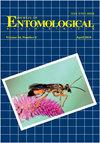Pathogenicity of Heterorhabditis bacteriophora in Ultraviolet Light–Irradiated Agar Suspension on Spodoptera frugiperda (Lepidoptera: Noctuidae) Larvae1
IF 0.7
4区 农林科学
Q4 ENTOMOLOGY
引用次数: 0
Abstract
Spodoptera frugiperda (J.E. Smith) (Lepidoptera: Noctuidae) is an economically important pest of variety of crops, including maize (Zea mays L.), rice (Oryza sativa L.), and cotton (Gossypium spp.). Conventional chemical insecticides are usually used for management of this pest; however, a viable alternative is the use of microbial agents or their biological products, such as entomopathogenic nematodes. Their efficacy, however, is affected by abiotic conditions including ultraviolet (UV) light and desiccation. It is therefore necessary to develop formulations that preserve or extend the viability of the agent or product while facilitating ease of application. This laboratory study was conducted to determine the pathogenicity of the nematode Heterorhabditis bacteriophora (Poinar) against S. frugiperda third-instar larvae. Infective juveniles (IJs) of the nematode were tested at a concentration of 350 IJs/ml in two substrates (water and 0.1% [w/v] agar suspension) with four periods of exposure (0, 5, 10 and 15 min) to UV radiation at 253.7 nm. Each of the eight treatments included 40 larvae, with each treatment replicated three times in a completely randomized design (two factors of type of medium and UV exposure time). We determined that the 0.1% (w/v) agar suspension, compared with the water substrate, protected the IJs from harmful UV light and thus improved the survival and pathogenicity of the IJs against third-instar S. frugiperda.紫外光辐照琼脂悬浮液中嗜杆菌异habditis对夜蛾夜蛾幼虫的致病性研究
摘要夜蛾(Spodoptera frugiperda, J.E. Smith)(鳞翅目:夜蛾科)是玉米(Zea mays L.)、水稻(Oryza sativa L.)和棉花(Gossypium spp.)等多种作物的重要经济害虫。常规化学杀虫剂通常用于控制这种害虫;然而,一种可行的替代方法是使用微生物制剂或其生物制品,例如昆虫病原线虫。然而,它们的功效受到非生物条件的影响,包括紫外线(UV)光和干燥。因此,有必要开发配方,以保持或延长药剂或产品的活力,同时促进应用的便利性。本实验研究了异habditis bacteriophora (Poinar)线虫对frugiperda三龄幼虫的致病性。在浓度为350 IJs/ml的两种基质(水和0.1% [w/v]琼脂悬浮液)中,对线虫的感染幼虫(IJs)进行检测,并在253.7 nm的紫外辐射下暴露4个周期(0,5,10和15 min)。8个处理中每个处理40只幼虫,采用完全随机设计(培养基类型和紫外线照射时间两个因素),每个处理重复3次。结果表明,与水底物相比,0.1% (w/v)的琼脂悬浮液可以保护IJs免受有害紫外线的伤害,从而提高IJs对3龄S. frugiperda的存活率和致病性。
本文章由计算机程序翻译,如有差异,请以英文原文为准。
求助全文
约1分钟内获得全文
求助全文
来源期刊
CiteScore
1.20
自引率
11.10%
发文量
40
审稿时长
>12 weeks
期刊介绍:
The Journal of Entomological Science (ISSN 0749-8004) is a peer-reviewed, scholarly journal that is published quarterly (January, April, July, and October) under the auspices of the Georgia Entomological Society in concert with Allen Press (Lawrence, Kansas). Manuscripts deemed acceptable for publication in the Journal report original research with insects and related arthropods or literature reviews offering foundations to innovative directions in entomological research

 求助内容:
求助内容: 应助结果提醒方式:
应助结果提醒方式:


